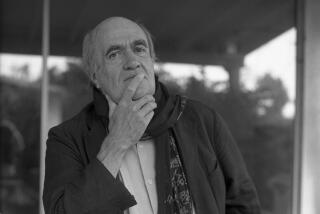Review: Christopher Bollen’s ‘Orient’ a literary thriller with wit and style
Christopher Bollen’s “Orient” might well be this summer’s most ambitious thriller or this summer’s most thrilling work of literary fiction. An editor at large for Interview with style and wit to spare, Bollen sets his juicy mystery at the tip of Long Island at summer’s end, when the season’s fleeting pleasures have blown away, revealing the fractured and fractious year-round community that remains behind when the casual visitors have returned to the relative safety of New York City.
The Orient of Bollen’s novel is of course Orient Point, the town at the eastern-most tip of Long Island’s less fashionable North Fork — think Gatsby’s West Egg to Daisy’s East Egg — which has so far resisted the Ralph Lauren and McMansion uprising of the Hamptons to the south. But the artists are coming, scooping up pricy shorefront properties, gutting the charming homes, bringing their cavalier city ways and transforming the quaint town as they see fit. And even if these newcomers believe their intentions are pure, it’s clear from the outset exactly how the road to hell is paved.
Enter Mills Chevern — not his real name — a 19-year-old former foster kid brought out to Orient by Paul Benchley, an Orient native turned successful New York City architect who perfectly straddles the community’s divide between the old and the new. Mills’ questionable sexuality and murky past immediately raise the town’s hackles. And when bodies start turning up, it doesn’t take long for Orient’s year-round population to point the finger in his direction.
With Mills, Bollen inverts the conventional “stranger comes to town” trope. Instead of the townspeople learning the truth about the intruder in their midst, it is the outsider who learns about the town and its inhabitants. And there’s a lot to digest — Orient’s residents, original and newly arrived, hoard innumerable secrets. As the death toll mounts, Mills scrambles to clear his name and uncover the real killer before he’s destroyed by the Frankensteinian mob of villagers.
Bollen gracefully shifts between Mills’ perspective and that of Beth Shepherd, an Orient native who’s recently returned to the town with her equally charming and unpleasant Romanian husband, Gavril, a majorly successful sculptor. Like Paul, Beth has a foot in both worlds, able to engage with the prickly locals and the overblown artists alike. Through these two former residents, Bollen draws the reader into a community at odds with itself, fighting to hold on to its eroding identity while resisting the change that has already come.
There’s a smorgasbord of delights in “Orient,” from its murderous plot to the cheeky fun Bollen has at the expense of the art world. And there is ample room in this expansive novel for surprisingly soulful descriptions of everything from the intricacies of beekeeping to the beauty of deer hunting. Most impressive is how Bollen’s book is rich in literary diversions, moments of keen sociological and emotional insight — often into personal isolation — that transcend the conventions of its story.
Bollen is dealing in extremes — an extreme situation and town peopled by extreme characters. It would have been simple for him to lapse into unkind parody at the expense of the right wing, xenophobic locals with their working-class accents and working-class tastes or to satirize the foibles and eccentricities of the New York City artists. Yet he resists this urge. Bollen is always witty, never snarky, and exhibits a generosity in his portrayal of each of the Orient residents, which makes everyone’s behavior toward one another, even at its most malicious, not simply believable but understandable.
There is no better way to access the emotional core of a community than through tragedy. And “Orient” has certainly enough tragedy to go around. By the book’s end, the body count is nearing the double digits and the plot is tiptoeing toward the melodramatic. Even so, when the novel draws to a close, it seems less important whodunit and why. More interesting is the community at the center of this calamity. It is impossible not walk away from this book without mourning the ravaged folks — old and new — left behind.
Pochoda is the author, most recently, of “Visitation Street.”
Orient
Christopher Bollen
Harper: 624 pp., $26.99
More to Read
Sign up for our Book Club newsletter
Get the latest news, events and more from the Los Angeles Times Book Club, and help us get L.A. reading and talking.
You may occasionally receive promotional content from the Los Angeles Times.







